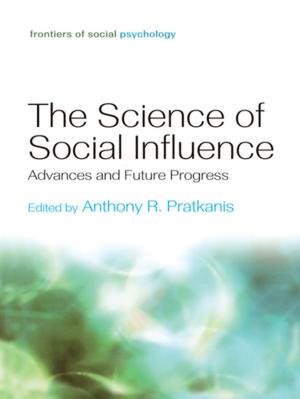Reading Groups, Libraries and Social Inclusion
Experiences of Blind and Partially Sighted People
Nonfiction, Reference & Language, Language Arts, Library & Information Services, Social & Cultural Studies, Social Science, Sociology| Author: | Eileen Hyder | ISBN: | 9781317071198 |
| Publisher: | Taylor and Francis | Publication: | April 1, 2016 |
| Imprint: | Routledge | Language: | English |
| Author: | Eileen Hyder |
| ISBN: | 9781317071198 |
| Publisher: | Taylor and Francis |
| Publication: | April 1, 2016 |
| Imprint: | Routledge |
| Language: | English |
Reading groups have grown rapidly in popularity and continue to be a significant cultural phenomenon. Reading groups in public libraries, linked to the learning and social inclusion agenda, have expanded to include a wide range of groups within society, including people with visual impairments (VIPs). This under-researched area is the focus of this book. Library-based VIP reading groups are interesting on many levels. Given that these groups predominantly use audio versions of the text (rather than print), this links to debates about the changing nature of reading in a multi-modal age. This book discusses whether contemporary society still defines reading as a visual activity or whether technological developments have led to a broadening of the definition of reading. The author goes on to discuss how policy is translated into practice within the library context and whether the wide range of reading groups linked to libraries suggests that libraries understand and are taking the social inclusion agenda seriously. She also explores how effectively libraries are using reading groups as a tool for delivering on the agenda for learning and how this sits within wider priorities for post-compulsory education and lifelong learning. Finally the book suggests ideas for future development for these groups, outlining ways in which their potential could be maximised for the benefit of both the library and the reading group members. The book will be of great interest to professional librarians as well as students and scholars of librarianship. It will also be of interest to those working on the emerging field of reading groups in literary studies. Those interested in the role of reading in education, as well as disability scholars, will also find the book useful.
Reading groups have grown rapidly in popularity and continue to be a significant cultural phenomenon. Reading groups in public libraries, linked to the learning and social inclusion agenda, have expanded to include a wide range of groups within society, including people with visual impairments (VIPs). This under-researched area is the focus of this book. Library-based VIP reading groups are interesting on many levels. Given that these groups predominantly use audio versions of the text (rather than print), this links to debates about the changing nature of reading in a multi-modal age. This book discusses whether contemporary society still defines reading as a visual activity or whether technological developments have led to a broadening of the definition of reading. The author goes on to discuss how policy is translated into practice within the library context and whether the wide range of reading groups linked to libraries suggests that libraries understand and are taking the social inclusion agenda seriously. She also explores how effectively libraries are using reading groups as a tool for delivering on the agenda for learning and how this sits within wider priorities for post-compulsory education and lifelong learning. Finally the book suggests ideas for future development for these groups, outlining ways in which their potential could be maximised for the benefit of both the library and the reading group members. The book will be of great interest to professional librarians as well as students and scholars of librarianship. It will also be of interest to those working on the emerging field of reading groups in literary studies. Those interested in the role of reading in education, as well as disability scholars, will also find the book useful.















